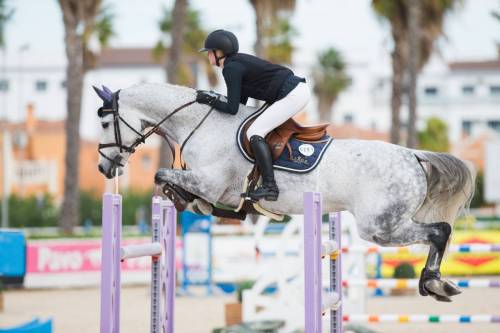If you were outside at 7pm during the Principality’s recent lockdown, you may have heard Martine Ackermann’s voice singing the national anthem of your very own country. Standing on her balcony in the Annonciade neighbourhood, Martine Ackermann managed to lift the spirits of people all around the world. Her renditions of 43 national anthems were viewed online and on news stations across the globe.


When Martine Ackermann isn’t singing, she’s spreading positivity in another way: as the founder and president of Child CARE Monaco (Charity Association for the Right to Education). Her association has built schools, a travelling library bus service and a centre for street children in India. She recently sat down with HelloMonaco to discuss the positive impact her school has had on the future of young girls in Jaïpur, India, as well as life in Monaco during lockdown and how singing on her balcony brought her neighbours a little closer during times of isolation.
HelloMonaco: You grew up in Nice. Can you tell us about your childhood, parents and family?
Martine Ackermann: Yes, they have a bakery, teashop and chocolaterie. When I was a student, I worked with them to earn money. I helped them every weekend and during holidays. I admire my parents because they gave the items that were not sold to the people outside every day. I was young and I didn’t understand in the beginning that they were poor people, but my mother explained it to me. Every day, they gave food to the poor and I was in admiration of my parents for that. I understood and my parents taught me that we have to help others, especially those who have nothing to eat.

Western theme – picture in front of Palace of Monaco © Andra Stylezza
HM: You learned at a young age that you need to help poor people. What made you decide to help people in India?
MA: The first time I was there was 25 years ago with my husband and I was really shocked by what I saw. I saw very poor children on the street, mutilated children, who were asking for money and food. I saw very sad scenes. I was not prepared for that. I heard a lot about India, but nice stories, luxury hotels, nice ceremonies, nice food, nice colours, but I didn’t hear about that side of India. And I was really shocked. It was 25 years ago but I still remember it like it was yesterday. We left the country and I thought I would never go back to this country, I was sickened. A few years later, I thought that I shouldn’t only focus on the negative experience, which is why I went back to India to do something instead of keeping my sadness inside. I did something for the poor people, for the children. So from the bad experience I had, I turned it into a good experience because I built a school and I help children.

HM: How many kids are enrolled at the school?
MA: In the school we built there are 110 girls. And in Jaïpur, we help 25 street children, we give them education.
HM: There is a big difference in attitude concerning education for girls versus boys in India because some people there believe it’s more important to educate boys. What do the parents think now?
MA: They are very happy regarding the school. It was a request from the parents in the village to have a school inside the village for the girls; it’s not something that I wanted, because when you do humanitarian things, you don’t push the local people. A lot of people ask me, «Why only girls?» You have to know that in India, boys can easily go to school and there is no danger for them in going. For girls, it’s totally different. They can be raped during a walk to school; it happens every day. For boys, they benefit from the philosophy there that the level of men is higher than women, so that some think that there’s no need to educate girls. The majority of locals did want a school in the village, but some of them were a little unsure. But now, due to its success, we have a waiting list and most of the villagers want to offer education to the girls.
I visit every year to spend one month with them in the village and the villagers know me. I wear traditional clothes and I’m totally integrated. And when you are integrated, it’s much easier to talk to the people. One thing I have to work on is marriage. Because child weddings are a tradition. There are children that are 6 or even 5 years old who are getting married. It’s an old tradition in those castes because the village is that of a lower caste, the untouchable caste. So, step by step we try talking to them to start an evolution regarding child weddings. We organized a meeting with the parents, the mayor of the village and with some people from the government and we said, «Maybe you could stop child weddings — or if you want to offer your daughter to a family, because it’s a tradition, maybe you could wait until the age of 16». At the beginning it was a little difficult, but we had zero marriages last year, so we are happy with that. Because it’s really sad. We have a story of one girl who left the school and the village because of this problem. She was 15 years old and she didn’t want to, but she left the village all the same.

HM: Do the children have a better chance of obtaining a higher education afterwards?
MA: Yes. We have three students, one of them learned Sanskrit, which is very difficult to study, another one is in university now. So it’s very motivating for the girls and even for the families. Normally, if you are born in a caste, you stay in the caste. There is a lower caste, a middle caste and a high caste, it’s a social thing you can’t change. Modi, for example, was from the chaiwala caste and now he’s the Prime Minister of India.
HM: Talking about the lockdown and COVID situation, it has affected people in different ways. Some people experienced depression, some people learned from the situation. What about you, did you learn any lessons from it? Did it change your mind about certain things?
MA: Yes, it changed my mind, in a good way, I guess. First, we had no choice. From one day to the next, we could not go outside, we could not go to a restaurant, we could not go shopping, we could not go for a walk. It was something we were not prepared for. It’s the first time I lived through something like that. We all had to live together in the house, 24 hours a day, with teenagers and with my husband. At the beginning, we had a meeting and I said, «Ok, we will live like this for one month at least, so there will be rules. Everyday, someone has to cook».

HM: Even your children?
MA: Oh yes, even the kids, they cooked what they wanted, but they had to cook. Every morning when we woke up, we put nice clothes on, I had my make-up on every day, no pyjamas, that was a part of the rules. And we ate lunch everyday at the table. Sometimes I was more «cool» and we could watch TV and eat in front of the TV, because that’s something we’re not normally allowed to do. But a family home is not a hotel and there are rules. It’s not like waking up one morning on holiday and you just wait for your lunch, it’s not like that with me, there are rules. On holiday, they can wake up at 12, but here they have to walk the dog, they have to prepare the table for lunch or dinner. Then, I realized that I had to do something, because it started to get boring for me, so I decided to make a show on my balcony everyday.
HM: During lockdown, every day, you performed here on your terrasse, singing the national anthems of different countries, which is really supportive of the international community here in Monaco.
MA: Yes, that was the idea.
HM: How did you come up with the idea to sing the national anthems of different countries?
MA: First of all, I was inspired by the Italians, because they really made a party every night. Of course, the situation was dramatic for everyone, for us as well. Instead of having bad feelings and living in negativity, I took the idea from the Italians to sing everyday, to choose a country first and then to sing the national anthem. And to talk about the country as well. It took three hours everyday to research information about the country I chose. My neighbours were there every night at 6:45 waiting for me. Sometimes I was late and I could hear «Martine! Martine!» I was here for 43 days and everyday I chose a different country, a different outfit and we had a lot of fun. I didn’t take myself too seriously, but I did it very seriously. We laughed a lot and had a good atmosphere and solidarity. It was a difficult time for everyone. Instead of staying at home and just becoming depressed, it was fun to do something for others.


HM: What was the most difficult anthem for you to sing?
MA: Russian was not easy, because I don’t speak Russian and there are no words similar to Latin, it’s not a Latin language. And I can say that the first time I sang the national anthem of Monaco, I was out of tune, it was a disaster and I really apologize to all my Monegasque friends. But I progressed, after 40–45 days, I’m now very good at singing the national anthem of Monaco.
HM: Did your family support you?
MA: Oh yes. My son filmed everyday. And on Saturday and Sunday, my husband filmed. But I had a lot of laughs with my son, he was very nice to help me. First, we filmed the sequence when I talked about the country for half an hour and then it was the livestream. For the livestream, my husband filmed. It took a lot of time and it was very nice of both of them to help me.
HM: My Russian friends said that it was a real moment of solidarity and support during a very difficult time. Which we will hopefully never have to go through again.
MA: First and last time, I hope. But I received a lot of messages. After the lockdown, I received wine, flowers, a basket of gifts, letters. The neighbours were really thankful and something very funny happened: some neighbours said, «Thank you, Martine, because we never talk to our next-door neighbours from the balcony». So, coming out every night, they suddenly discovered that they have neighbours and they became friends.

HM: Every year you organize a women’s vintage car rally in support of your association. How was it this year?
MA: On Sunday September 13th was the 7th edition of Monaco’s Lady Vintage Car Rally. This year’s theme was «The Far West». After such a long lockdown, driving around the French Riviera in vintage cars was a real joy for all of us. Guests were dressed up in Country and Western styles, cowboy boots and heavily-fringed suede jackets. The Wild West spirit was truly present on the French Riviera.
This year, during the rally, Child CARE Monaco raised 11,000 euros, of which 4,000 euros will be spent to buy essential food kits for low-income families. The remaining amount is intended for the construction of two new classrooms in the school. Thanks to everyone for your kind support, it was an incredible day.

Flowers theme – picture at Place du Casino, Monte-Carlo © Andra Stylezza









